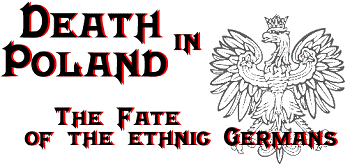
by Edwin Erich Dwinger
The deportation and expulsion and the mass murder of the ethnic Germans before and at the beginning of the war in Poland was by no means confined to the "Bloody Sunday of Bromberg", which is only too often downplayed or even denied outright today. In this book the reader experiences almost first-hand the terrible fate of tens of thousands of ethnic Germans in Poland at the outbreak of the war in 1939. This English translation, published here for the first time in 2004, commemorates the 65th anniversary of these events that are an eternal stain on the family bibles of all subsequent Polish generations!
Source
A Word in Advance
While making this book ready for the Internet we had the great good fortune of coming across another book on the same subject which contained documentary photographs that fully substantiate the accounts on the pages that follow here. Nonetheless we hesitated for a long time before deciding to add these photos to the text, because many of them are so horrible that they may shock our more sensitive readers. Still, we believe that we owe it to the brutally butchered victims from our grandfathers' generation to bring the graphic evidence of their sufferings to light.
In order to somewhat reduce a potential shock, we are adding the photos into the text only in reduced size; anyone who feels up to details can enlarge the pictures by clicking on the appropriate link.
The photographs as well as their caption texts are taken from the book Dokumente polnischer Grausamkeiten: Verbrechen an Deutschen 1919-1939 nach amtlichen Quellen [Documents of Polish Brutality: Crimes against Germans, 1919-1939, from official sources], published by Arndt-Verlag, Kiel, 1995. Significantly enough this book is now banned in the vassal state that is modern Germany.
Scriptorium, September 2004,
the 65th anniversary of the events described in this book.
the 65th anniversary of the events described in this book.
This book was the hardest of all the tasks
that our age has posed me to date in my capacity as chronicler:
it contains nothing but the naked truth,
every name is that of its true bearer,
and every account is based on a sworn affidavit.Edwin Erich Dwinger, 1940
On November 1 of the year 82 BC, after the decisive battle of Colline Gate, Lucius Cornelius Sulla ordered the execution of those lists containing the names of all of tribune Marius's followers. With these public lists, which were called proscriptions even though the term had used to mean only lists with which public sales were announced, Sulla's legionaries went from house to house, killed all those who were named on the lists, raped their women to death, and set most of their houses on fire. Some 2,000 citizens were murdered that day, and proscriptions came to be known forever as calls to kill people who had been outlawed.
On March 30, 1282 AD, around the time of Vespers on Easter Monday, the people of Palermo rose up against the French who had unlawfully occupied Sicily under Charles of Anjou. Within only a few hours 4,000 French noblemen were killed in Palermo. Their women and children were also not spared. The raging mob dragged them from their houses and tortured them to death in the streets. Like a flame the killing spread through the entire land and marked the beginning of the reign of Peter III of Aragon. Here too, a kind of proscription list was used to identify and eliminate everyone who was pro-French. The uprising itself has gone down in history as the Sicilian Vespers.
On August 23, 1572 AD, Catherine de Medici, then Queen Mother of France, decided to wipe out the Huguenots. She had invited all the important Protestants to Paris to celebrate her son's wedding, and in this case the guest list doubled as the proscriptions. At midnight the alarm bells were suddenly rung, and before most of the Huguenots were fully awake they were already cut down by the henchmen's daggers. The first to fall was their brilliant leader Admiral Collignon. They were plunged out of the windows, their bodies desecrated. This murder spree claimed some 20,000 lives throughout the country and has come to be known as the Massacre of St. Bartholomew's Night.
On September 3, 1939 AD, the third day of the Polish Campaign, Warsaw issued a broadcast. It only stated tersely that Order 59 was to be carried out without delay. This was in fact the secret signal to execute proscriptions that had been prepared well in advance. After this broadcast the Polish people, urged on by their soldiers and officers, descended upon the ethnic Germans and murdered 60,000 of them within a few days. Only few of them were shot, most were brutally beaten to death, and even the corpses were desecrated in great numbers. What is the name under which this deed will go down in history - what will humanity call it one day?
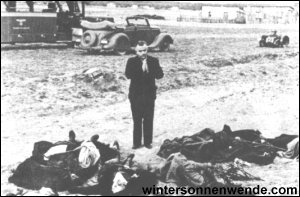
The Protestant German Minister of the Heart of Jesus Church in Bromberg, in silent prayer before the bodies of murdered ethnic Germans from Bromberg.
|
September 3rd was one of those summer days one only finds in the East: the sky devoid of clouds, its blue a bit faded, and with a dry wind blowing in from Russia. In the gardens the trees were weighed down by fruit, along the fences the dahlias were bursting into bloom - if this weather held a bit longer it would make for a bountiful harvest. But would there even be time to bring it in, seeing as war with Germany had broken out two days ago?
Just as an impending thunderstorm on a hot day makes itself known in advance, a strange, gloomy tension lay in the air. For months already the Germans had suffered under Polish trespasses, but now there was something new evident in their manner: why did they suddenly look so strangely at the Germans, why did even close acquaintances no longer speak to them? It had still been possible that Sunday morning to attend church in Bromberg without coming to harm, if one avoided speaking German loudly enough to be overheard. At most one had to get out of the way of groups of singing soldiers in the streets, but most Germans did get back to their homes unmolested. And so they now sat in their Sunday best in their rooms, or if there were gardens around their suburban houses, they also sat in the small garden pavilions while the children set the tables for lunch.
Admittedly, since the first day of the war many had been arrested again, primarily of course the known leaders of the ethnic German movements, but so far no complaints about the treatment of the arrested Germans had been heard, since most of them had not returned from the prisons and one could therefore only conjecture about what was happening to them. Might the upshot of it all be a new border zone law, after the first had already expropriated so many of them? And so the German citizens continued to sit silently beside their radios and listened with pounding hearts to the German stations and to the reports of the German army's rapid advance. It's only a matter of hours, some said, before we too will be liberated here! And even if it takes a few more days, said others, all in all our time of suffering is over...
Chapter 2:
The Fate of a Bromberg Family - the Schmiedes
The family of the gardener Schmiede was among those waiting for lunch. Six little children run like foals around their tall mother. Finally the maid appears in the doorway, holding the longed-for bowl. They are about to sit down when the apprentice enters the room. "What news?" asks the master gardener. "Just this same call," says the apprentice, "for an hour already! Carry out No. 59, they say over and over again, carry out No. 59. I don't understand it..."
Master Schmiede bites his lips and silences his apprentice with a quick glance. But his wife has already noticed it, and asks from out of the midst of her children: "Surely they're not hatching some devilry...?"
"What should they do to us? We're all civilians! We've always done our duty, paid our taxes more conscientiously than the Poles themselves, served as good soldiers in their army... And that we don't have any weapons, well, everyone knows that too - for one thing they've searched every house ten times over, and for another, the borders have been closed for months to the point that one couldn't smuggle even a pocket knife through! It's already been a long time since they took away whatever guns were still around, and none of us could have got new ones, so what on earth could we possibly do against them? Maybe they'll drive us out of the city if they have to surrender Bromberg to the Germans, that's something we have to expect, of course..."
"Shouldn't we better flee after all?" asks Frau Schmiede in sudden fear.
"Only yesterday," says young Frau Ristau, the wife of an employee who has helped in Schmiede's nursery for years, "Pinczewski said to us, as soon as war breaks out we're going to take you Hitlers and tear you apart by the legs so that your entrails wipe up the dirt..."
"Calm yourselves!" Master Schmiede cuts them off. "Besides, it's too late, the troops are already retreating - anyone who gets between them now is in more danger than in his own house..."
He was right, it was too late. For at that same hour the Poles were already setting out on their evil deed, and suddenly thousands of them advanced through the streets of Bromberg - like a scorching flow of molten lava they filled every path and alley, penetrated every German house like in a fever. The core of these mobs were soldiers, accompanied by rabble, and students often showed them the way to their targets.
One of the first houses they reached was the Schmiede Nursery. Didn't its size and importance make it particularly hated in that part of the city? The arrivals are a group of soldiers with fixed bayonets - but what wild faces they have, are they perhaps drunk beyond all measure? Schmiede greets them with cautious politeness, but in his agitation he forgets his Polish. "You can't speak Polish, you son of a whore, but you've got weapons!" yells one of the soldiers.
"I've never had a weapon, but feel free to search the house!" Schmiede replies accommodatingly.
"What house search - three steps back!" the soldier screams in reply, lifts his gun with a jerk...
Schmiede is mortally wounded right away. His wife throws herself beside him in horror and now they fire three rounds at her, but oddly enough none of them find their mark any more. She leaps to her feet again, cries like a madwoman for her children, yanks them out the door with her and flees down into the basement with them all.
This general flight happens so suddenly that the Poles do not have the opportunity for further shooting. And so all of them reach the basement safely - six little children and their mother, her aged father, Adam by name, the nursery employee with his wife, the young apprentice, and the maid. The basement is set up as an air raid shelter, there are two water barrels there as well as several bottles full of vinegar, and a basket of towels in the corner. The escapees can only just barricade the basement door before the next shots ring out, punch through the thick boards, and shatter the window. They throw themselves on the ground for shelter, the mother lies close by the brick wall, she has pulled all her children down to her and huddles over them like a mother hen over her chicks.
For a while they lie there like that and try to calm the screaming children, while boots pound past the windows above. They appear to be looting the entire house; drapes drag past the windows next to the soldiers' boots, furniture tumbles with a crash down from the first story, and a pile of wreckage forms in front one of the basement windows but is eventually dragged off as well. But suddenly the apprentice raises his head, his young face turns yet another shade paler, and finally he forces the words through trembling lips: "It's burning upstairs..."
Now they all hear it. It's indeed burning, the flames crackle quite audibly, the window panes above them burst explosively, and right away the draft carries the smoke downstairs. "They want to burn us all!" cries the panicked apprentice and climbs out the window in insane fear, but he has barely stood up outside before a bullet hits him in the head and slams him to the cobblestones. "Out with all of you," screech some women, "so we can do you like we did him..."
But the mother takes up the battle, the battle against the heat and the ever more choking smoke. She crawls over to the basket, takes towels out, dips them into the water barrel, pours a little vinegar on them and places one over each child's mouth and nose. Some of the children are so little that they don't understand, time and again they throw off the towels and then threaten to suffocate in an instant. With each passing minute the air grows hotter - the iron girders above them are already glowing red, and aren't some of them already sagging noticeably?
"I don't want to burn, I don't want to be buried alive!" young Frau Ristau suddenly cries, takes her husband by the hand and bolts out the basement door. Curiously they make it all the way to the street now - but there the raging mob is everywhere. The two are immediately recognized as Germans, and the civilians shout provocatively to the soldiers: "You have to shoot them down, they're real Hitlerowzi!"
Before the wife can even beg for her husband's life a bullet tears into his head from close range. A soldier throws himself over the body, pulls the new pair of shoes that Herr Ristau has only worn three times since his wedding off the corpse's feet and throws them to those who had denounced the victim as German, as a reward for their denunciation. Then he drags the wedding ring off his finger, but when the wife begs him, sobbing, to leave her the ring as a memento he beats her over the back with his rifle butt so that she collapses unconscious on her husband's body. But right away the mob yank her back to her feet by the hair, beat her to force her hands over her head, and then chase her at a run through the streets, accompanying her with shrill howls. But she is no longer the only one by any means, all the streets are scenes of such hunts, every ten steps or so there is another staggering German, most of them are covered in blood from repeated blows, some also have severe bullet wounds. Any that collapse out of weakness while running are immediately clubbed to death.
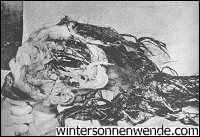
Mrs. Frieda Ristau, 31 years old, one of the group murdered in Eichdorf-Netzheim; mother of 3 children who were fortunate enough to escape being murdered. Skull blasted by gunshot fired at the back of her head.
Sekt.-Nr. - Br. 88 (OKW./H.S.In.) Enlarge |
But Frau Ristau makes it - she doesn't collapse completely, she reaches the police headquarters with her last strength. An officer sits at a table. His hair is neatly parted, his fingernails are buffed, and he looks bored as he gazes at her ravaged face. "Why don't you just shoot me too," the woman cries, "I don't want to go on..."
But the officer waves dismissively, they chase her back outside, and a soldier yells after her: "A bullet is too good for you, you ugly Hitler, but no doubt someone will beat you to death!"
The young woman gets away without further harm. Does she look so dreadful in her pain, with her hair falling wildly over her face, covered all over with her husband's blood, that even the most rabid of the mob shrink back from her? She washes the blood off her face in a ditch and hurries back to the Schmiede estate. Her husband's body still lies there not far from the garden gate, a howling mob dances around him, the burning house casts gruesome shadows on him, and these shadows make his shattered face seem to smile a little. "You damned Hitler are still laughing?" yells one of the soldiers mockingly, runs to a garbage can, returns with a double handful. Half a dozen rioters seize the trash from his hands and throw it at the corpse's head. But for one young marksman even that is not enough, and yelling hysterically, he stuffs the filth into the corpse's open mouth...
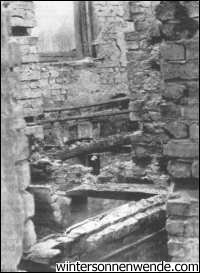
Ground floor and exposed basement rooms in the Schmiede house, totally gutted by deliberately set fire. 16 people had to endure the heat for 8 hours in the basement because the windows were being shot at. Not until later could the ethnic Germans crawl into a different basement room, whose ceiling was of concrete.
|
Even despite the hellish noise of the fire this dance of death carries all the way into the basement, where Frau Schmiede still huddles with her children. The room is gradually getting so torrid that her clothes cling to her body soaking wet, and the stone walls are so scorching hot that one can hardly still touch them. The children scream incessantly. Time and again she places fresh vinegar towels over their mouths, but she still has to do it all while crawling on her stomach, otherwise more bullets whip in through the windows again right away. Night is falling outside, and the spine-chilling howling around the house now sends almost all the children into outright convulsions. Shortly before midnight there is a deafening cracking sound above their heads, the iron girders bend almost in half, but ultimately they do hold. The house collapsed over top of them, but they were not all buried alive under it.
With the collapse of the burning house the crowd disperses, but it is not until morning that the woman dares creep out. She hopes to fetch some food for the children from some acquaintances, but only a short distance out she falls into the hands of a patrol. They immediately drag her to the police station. Only young civilians are there, and one sixteen-year-old is busy signing the death sentences. She is shoved into one of the many rooms where hundreds of Germans are already crowded together. She falls unconscious into an acquaintance's arms, but a terrible screaming wakes her again the very next moment. A Polish soldier has yelled in the door that they would all be gassed to death now. And in fact a pipe is pushed in through a window, and a strange blowing sound comes in from outside. Already they believe they smell the almond scent of mustard gas. A mindless chaos breaks out, many fall to their knees in prayer, a minister's ringing voice recites the Lord's Prayer - but none of them sink to the floor from this gas. No gas is kept in this station at all, their tormentors only wanted to revel in their agonies and have some fun with them...
Chapter 3:
The Fate of a Bromberg Family - the Radlers
Around the same time, they invade the home of the Radler family, whose estate is located at the lower end of the Wladyslawa Belzy. Here there are only five soldiers at first, who pretend to be looking for a machine gun. They point their bayonets at the family members, herd them from room to room, turn the entire house upside down. "Which one of you is Fritz?" one of them finally yells.
Fritz, a nineteen-year-old recent high school graduate, steps forward with calm dignity. "Where shall I stand?" he asks proudly. "You're just going to shoot me anyway." Oh, my boy, his mother thinks, I always thought highly of you, but even so I never knew you're such a noble person.
"How did you guess?" the leader of the gang laughs. "Over there by the garden fence..."
Fritz wants to shake his parents' hands farewell, but the soldiers drive them all back with their bayonets. So he walks outside with a disdainful toss of his head, stands tall by the garden gate along the street. The next instant the shot already rings out, but now, when the father runs outside despite the bayonets and throws himself on the ground beside his dying son, one of the Polish officers launches himself at him in rage and hits him over the head with his riding crop. "Back into the house with you, you Hitler bandit, or I'll shoot you too!" he screams over and over again, and drives Fritz's father back inside.
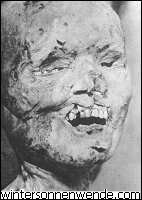
Fritz Radler, 19 years old, member of the murdered Radler family. Blow from bayonet or sword to chin and near right eyebrow. Fritz Radler was killed by a shot to his chest with a Nagan revolver; the bullet remained lodged in his chest.
Sekt.-Nr. - Br. 48 (OKW./H.S.In.) Enlarge |
Oddly enough the afternoon passes quietly, and even in the night there are no more incidents. The family sits indoors by their daughter's sick-bed. All of them think of the oldest boy. He had been an extraordinarily bright boy, hadn't he gone through his entire schooling as the best in his class? Hadn't they scrimped and saved all their life in order to be able to send the boy to college? They recall his many nature hikes, on which he had always drawn sketches since his great plan was to publish a hand-drawn travel book, a guide to their entire home region, the West Prussian region he had loved so much. The book was also to include charming little caricatures; hadn't he made them laugh many a time with his drawing talent?
"Mother," says Heinz, who is only sixteen, but with such a nobly sculpted face that he looks like a model of his race, "if the Poles should come again, I won't be able to just stand there like Fritz..." He breaks off suddenly, embarrassed, and whispers fervently to himself: "I want to live to see the new Germany, I must live to see the new Germany!"
At seven o'clock the next morning a cavalry unit suddenly stops outside the house, and a few riders fetch the father to water their horses at the pump. "Don't you have any milk?" one of the riders asks.
"I'll get you some," says young Heinz, runs to get a cup, and gives them milk from a pitcher.
They slurp it greedily, but one of them says: "I guess that's one of you, lying there in front of the house - served him right, the young Hitlerowzi! Now he's gaping like a fish out of water..."
"My brother was innocent," says Heinz, sobbing, "he was just brutally murdered..."
And with that, it is suddenly as though they had just waited for their cue - three at once raise their fists, rain blows on him. Heinz lifts his hands over his head, tries the get away from the blows by fleeing into the back yard garden. Two of them fire after him right away, but they do not hit him until he is in mid-jump over the last fence. Heinz gives a terrible scream - and in that scream there lies his entire youth, all his burning disbelief. He kicks out desperately, but it all does him no good, he will not live to see the new Germany...
When his father hears the shots, he wants to leave the horses at the water trough, but the soldiers point their bayonets at his chest and mock him: "It's none of your business what's going on, you just stay here and finish your job..."
He continues with trembling hands to water the horses, until he hears a hand grenade explode inside the house - then he drops the water bucket and rushes into the house despite all threats. He finds the living room door shattered, but his wife and daughter are unharmed. "They hunted Heinz.." his wife can just call out to him, before they hear the soldiers roar for him in such fury that he rushes back to the pump. But this time he has barely stepped outside the door before a bullet smashes into his throat, exiting through the shoulder in such a way that it tears a large chunk of pink lung out with it.
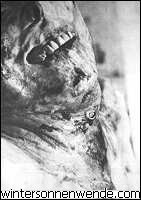
Arthur Radler, 42 years old, member of the murdered Radler family. Bullet entry hole in throat at the left. The corresponding exit wound is at the back of the neck, at left. The injury was not immediately fatal and Mr. Radler suffered for more than 7 hours. His wife and 14-year-old daughter were prevented from helping the badly wounded man. He was eventually killed by a shot to the head.
Sekt.-Nr. - Br. 46 (OKW./H.S.In.) Enlarge |
He falls to the step outside the door, but he won't be dead for a long time yet. Foamy bubbles form at his mouth, he rolls down off the step, and suddenly cries, half-sobbing, "Shoot me dead, why don't you finish me off..." But the soldiers only laugh at his pleas, and whenever one of them is tempted to give him the mercy shot he is always stopped by one of the civilians who have been crowding into the garden for some time already. "Let him croak slowly so that he'll enjoy it," they call out to every newcomer arriving from the street.
When the mother sees her husband suffering like that, she asks her daughter to try to give her father at least a sip of water. But the soldiers knock the cup out of the girl's hand, this pretty, slender girl that looks so much like her younger brother, and kick her to drive her back into the house. "Where have you buried your valuables?" one who followed her in asks them. "Tell us this instant, or we'll butcher you!" They drag the mother across the body of her dying husband, into the garden, make her show them the spot, and quickly dig it up with their trench-digging spades.
The hiding place is only a few meters from the dying man. He constantly begs his wife for water, but again they prevent both mother and daughter from going to him. When they finally unearth the buried suitcase they howl with glee as they distribute the contents. The civilians are the greediest as they help themselves.
While they're still busy with their spoils, an officer of higher rank gallops into the yard, spurs his horse right up to the dying man, spits down onto his face several times from above, and yells down at him mockingly: "No doubt you feel better now, you Hitler bandit, why don't you scream for him..." Only after this gentleman has ridden off again, a soldier finally takes his rifle and kills Herr Radler with a shot to the head at close range, fully five hours after the first shot...
Now they drag the three corpses together, dump them outside the living room where the two women have fainted on the floor, and yell in through the window: "Now dig a hole, but make it three meters deep..."
The two women stumble outside. Their three dead are lying together in wild disarray, at the bottom is the father with his head shattered, half on top of him Heinz, with wide staring eyes, and beside them, the eldest son, his face calm and composed.
"But what shall we use to dig?" Mother cries.
"Your fingers," the soldiers laugh, "scratch like cats if you have no tools..."
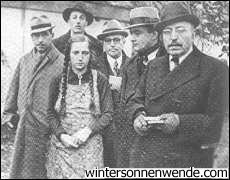
Foreign doctors listen to the eyewitness report of 14-year-old Dora Radler from Kl. Bartelsee near Bromberg about the murder of her father and both her brothers. Left to right: Dr. Espionsa (Chile), Dr. Karellas (Greece), Dipl. Ing. Santoro (Italy), Dr.Faroqhi (India), Dr. Ohanian (Persia).
|
The daughter fetches a rake, it's all she can find. They use it to scrape out a hollow, but how on earth should they make it nine feet deep...? The sick young girl is so weak that she can hardly stand, she helps her mother by scooping with her hands, while the soldiers revel in the sight of them: what a job for these dog-blooded Germans! But when the hole is three feet deep they are suddenly bored with it all, shove the two women back from the pit, and yell at them, satisfied: "Now throw them in, your three Hitler cadavers..." The two women are too weak, they can barely drag the lightest of the three, young Heinz, from his place. The soldiers pitch in and roll the corpses towards the hole with their feet... "And now cover them up!" their leader orders.
Frau Radler bends over the grave. The body on top happens to be her husband. "And now I should even... throw dirt on your face?" she whispers soundlessly, and suddenly shrieks like a madwoman: "No - no - no! Now it's enough, now I won't go on, just shoot me now, my daughter too..."
"Well, listen to that," the soldiers chortle, "all of a sudden! And after she's been so obedient so far! But give us twenty zloty, woman, and we'll throw the first dirt on them, and all you have to do is finish up..."
And Frau Radler drags herself into the house, to look for her last twenty zloty...
Chapter 4:
Bromberg Highlights
While this went on in the Wladyslawa Belzy, another group of rabble ranged along Chaussee Street. It was led by the block commander of the Anti-Gas Protection Service, a fanatical Pole by the name of Owczarzak. Most of the group wore knuckle dusters, some carried only truncheons, others had crowbars in their hands. When they passed the house of bank procurator Finger, Owczarzak waved the mob towards the windows.
Certainly, the family Finger had barricaded the door, but the soldiers break it down with their truncheons and rush into the study where Mr. and Mrs. Finger are hiding. "Down on the floor!" one of the soldiers yells at the man. The latter lies down on the floor, his wife throws herself beside him. To the howling of the crowd the soldier presses his rifle against Mr. Finger's chest. With mechanical casualness he pulls the trigger. The sound of the shot fills the small room where one could almost expect one's eardrums to burst. Then they yank the woman back to her feet and beat her to force her to stand still. They rummage through every corner of the house and throw the valuables to the civilians. In the end they also find the couple's two young sons. To constant beatings they lead them outside, where they join up with other mobs leading entire groups to the police station.
At the station the mob tries for some time to force their victims into the station with the help of beatings, but nonetheless only a few of them can still fit into the overcrowded rooms. So instead the rabble heads for the government building, but on the way there they meet up with another group, led by railroad men from the French railway of Gdynia. "Where are you heading?" one of the civilians asks them. "We're going to hunt the Beyers!" replies one seventeen-year-old, called Gaca. Quickly the mob decides to participate in this chase, and together they march up to the Beyer property. Here too, the game begins with the same old question: Hand over the machine gun you've hidden!

Heinz Beyer, 10 years old, and the assistant gardener Thiebe.
Enlarge |
The Beyer family consists of six members. Aside from the husband and wife there are two sons, one of them eighteen years old, the other only eleven, as well as an aged grandmother and an assistant named Thiebe. "So you don't have a machine gun!" one of the railwaymen yells, reaches into his pocket, pulls out a cartridge. "So what's this, that I found in your study?" All of them howl with glee and Gaca demands the Beyers' immediate execution. But after a long back-and-forth they decide to take the family with them instead; that way they would have leisure to confess their dreadful crimes before being shot. "Not my little one?" Frau Beyer cries beseechingly. But they hit her across the mouth so that the blood spurts from her lips, tear the little boy out of her arms, and take him away along with the men.
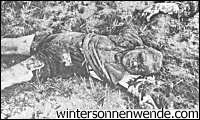 |
As they tramp down the street again, another squabble breaks out. "The railway police should deal with them," one of the railwaymen says, "they don't belong into the government building! We want to do our share too, the city police doesn't need to get them all..." Since the rabble cannot agree, they eventually go their separate ways. While the first group returns to the government building, meeting up along the way with several other packs each leading half a dozen Germans, the group of railwaymen head for the railroad grounds. The next morning all four of their victims were found there, shot. The eleven-year-old boy was lying underneath his father; his left forearm was shattered, he had a deep cut above his left eye as well as two bullet wounds in his chest. But while the others had already been dead for three hours, this child still clung to life until noon...
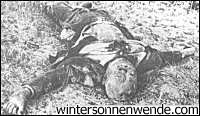
Gardener Friedrich Beyer
Enlarge |
As the first mob approached the government building, they could already hear from a distance the sound of screaming, those chorus-like screams of people maltreated to death. Even outside the gate some two hundred corpses litter the street. As they arrive in the long corridor with their Germans, the latter see at least forty soldiers who have lined up to form a gauntlet. They are the first to have to make their way through this line-up. Blows from truncheons hail down on their backs. Several officers sit in the interrogation room; they order the Germans to kneel down and give three cheers for Marshal Rydz-Smigly. A highly pregnant woman does not understand the order right away, so a guard stabs his bayonet into her belly. When the woman's screams do not end quickly enough, the high-ranking police functionary Roberschewsk orders one of his subordinates to crank a little hand-siren to drown her out.
Owczarzak hands his prisoners over as requested, and roams through the building a little before leaving. In one room he finds ten buck-naked Germans who are being tortured to obtain some kind of confessions. Seven of them are already dead, three are still whimpering. All of them have been dreadfully beaten. At that moment Roberschewsk returns to this room, hears the whimpering, and impatiently calls out to the policemen performing the torture: "They're still alive?" He takes up the bloody ax leaning against the wall beside those who are already dead, and gives each of the remaining victims several whacks on the head...
Owczarzak returns to the corridor, where he sees with surprise that quite a number of Germans are being released. "You can go home!" the officer says with a smile. Some twenty Germans run out as though the hounds of hell were nipping at their heels. But this too is only a game. They have barely reached the gate when a dozen soldiers from the gauntlet line-up take aim and mow them down with rapid fire, shooting them in the back. So now there are not two hundred, but two hundred and twenty corpses littering the street in front of the government building.
At that moment an acquaintance who has also just brought in a group of captured Germans calls out to Owczarzak. "I know where there are some more," he calls to him, "in Thorn Street, quite a way out! But there's a woman among them, have you had one yet today...?"
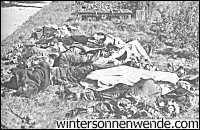
At the end of Thorn Street in Bromberg the bodies of 10 ethnic Germans were discovered, beaten to death and mutilated.
Enlarge |
Owczarzak joins him immediately, and soon a few soldiers also fall in with them. On the way the group almost falls victim to friendly fire, because just as they are crossing the corn-market square another troop is firing a machine gun at approximately one hundred Germans who are being herded across this square to the great police prison. Owczarzak's group flees head over heels under the nearest archway and end up having to climb over dozens of corpses to get back on their intended way. Again they have to walk quite a distance, but finally they are outside the desired house. The soldiers immediately fire through one of the windows, which prompt the inhabitants to flee into a shed. They are old Mr. and Mrs. Gannot and their daughter, a girl nineteen years of age. When they refuse to come out of the shed, a soldier throws a hand grenade in. Nobody is seriously injured by it, but now the three fugitives come out, trembling. The daughter asks the mob in Polish what they had done to deserve this.
"You're Germans - and that's enough!" the civilian yells - and one of the soldiers adds: "Down with these swine!" Simultaneously he raises his rifle and hits the man in the face with the butt, and several others immediately copy him. Old man Gannot falls to the ground, and they stab him with their bayonets and fire at him six times even after he is already down. When his daughter runs for water and returns with a bowl in order to wash the blood off her father's head, they hit her in the face, left and right, and rain truncheon blows on the old mother.
Horrified, the girl flees. Skirts flapping in the wind, she runs down to the river Brahe that flows behind their estate, and in her despair leaps into the water. But the civilian cuts her off, grabs her by her loosened braid and drags her out of the water again by her hair. Some ten men now seize her at every limb and carry her into the house, into the bedroom. "Now get changed, you're totally wet!" says the civilian, strangely friendly all of a sudden. "You'll see, we Poles aren't that bad, go ahead and get changed..."
But when none of them leave the room, the girl makes no move to change her clothes and just continues to cry quietly. And at that, their patience is already at an end. Six of them hurl themselves on her, tear the clothes off her body in tatters, and throw her, completely naked, onto the floor. While almost ten men hold her down - one gags her, a couple pin her head to the floor, four hold down her arms, and two sit on her ankles - the civilian throws himself on her like an animal...
next
The Danse Macabre of Bromberg Spreads




1 comment:
danke.
Post a Comment